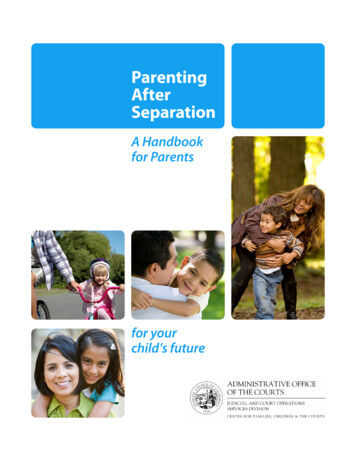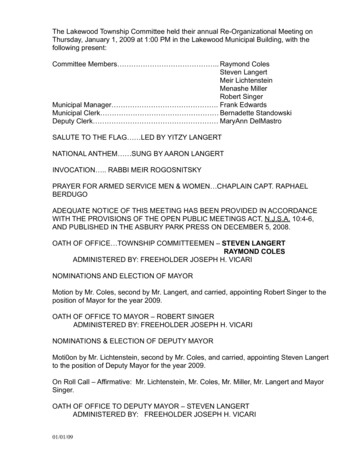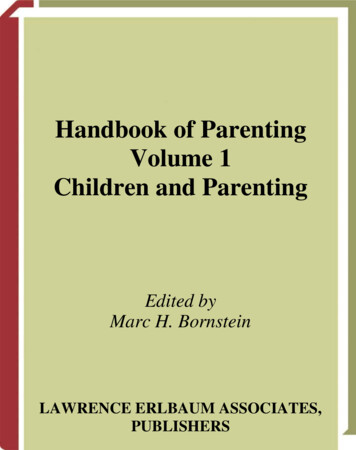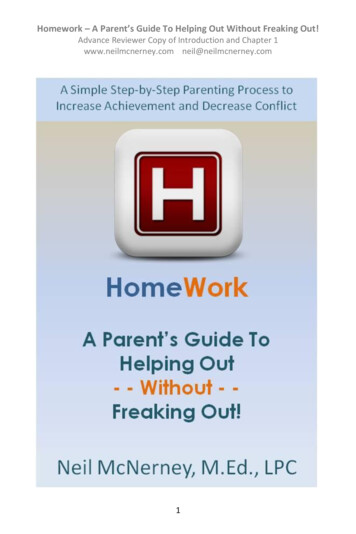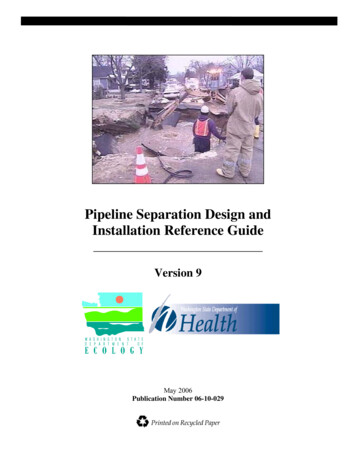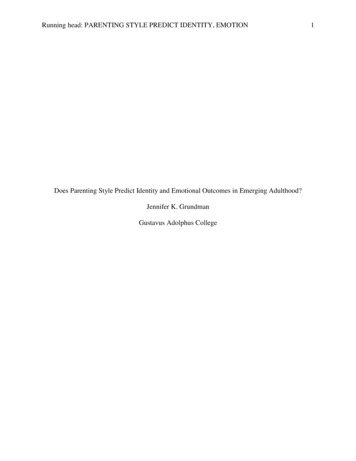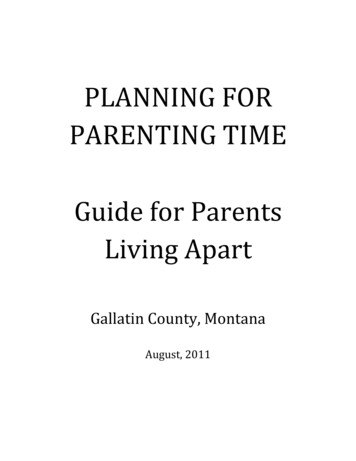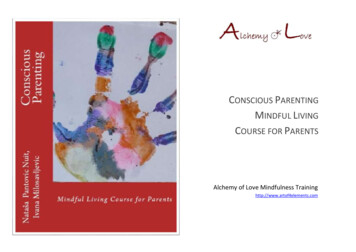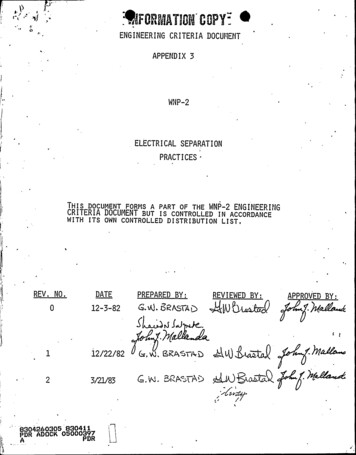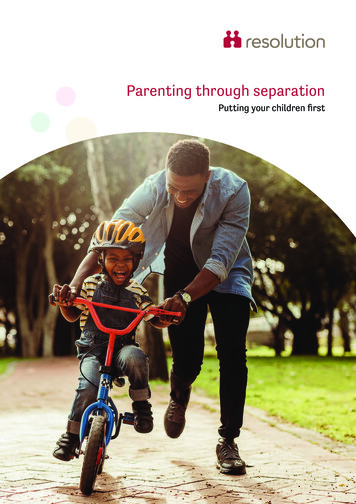
Transcription
Parenting through separationPutting your children first
Parenting through separation: Putting your children firstwww.resolution.org.ukWho are Resolution and theParenting After Parting Committee?Introduction to this GuideContentsWe are Resolution. We are a group of family justice professionals(lawyers, mediators, therapists and coaches) from around thecountry. We work with families and individuals to resolve issuesin a constructive way.Becoming a separated parent is not somethingyou may have anticipated. It is challenging inso many ways and can be very daunting.Who are Resolution and theParenting After Parting Committee?2Introduction to this Guide3This guide aims to give parents access toinformation and support that helps themthroughout their parenting journey, throughseparation, divorce and beyond.Sharing our Stories4The end of the relationship – what doesit feel like and what will happen now?6What should my first steps be now thatI have separated from my partner?8We were founded in 1982 by a group of family lawyers who believedthat a non-confrontational approach to family law issues would producebetter outcomes for separating families and their children. Over thedecades the organisation has grown to become a membershiporganisation for professionals working with separating families.We are passionate about helping families to navigate the challengesof parenting in the wake of separation in the best way possible fortheir children.We know that divorce or separation can be very difficult. But, whenparents learn to work together to support their children, this leads tooutcomes that are better not only for children, but also for parentsthemselves.Our vision is of a world where families facing difficult change aresupported so they can achieve child-focused solutions and forconflict to be taken out of family law disputes.That is why our Parenting After Parting Committee has producedthis guide – as a resource for parents going through separationor divorce.We hope this guide will be helpful not only for separatingparents, but for all those supporting them2We can’t promise it has all the answersyou seek, but we hope it will provide youwith helpful information on how to finda constructive way forward at whateverstage you are on your journey.It may be that you are still in a relationshipbut fear it may soon end; you may havejust separated from your partner and beapprehensive about what the futureholds; or you may have been separatedfrom your ex-partner for a considerableamount of time – but for various reasonsare unable to co-parent, leading to parentalconflict. Whatever your situation, we hopethis guide enables you to find helpfulsolutions and that you refer to it as andwhen it’s needed.Your new co-parenting role10Communication11How important is the voice of the child?18Extended Family23What are the types of dispute that mightarise between separating parents?24The future and changes that mighthappen along the way26How could things look if we get this right?28We can’t agree and need help29What is the legal position?32Jargon Buster34What do I do if I have been in anabusive relationship?36What resources can my child(ren)and I refer to?383
Parenting through separation: Putting your children firstSharing our StoriesTwo members of the Parenting after Parting Committeeshare their stories.We are privileged to introduce this guide for parents who areseparating. Bringing up children after separation is truly oneof the hardest things. We want to share our stories with youin the hope that they might help you choose to keeppersevering to bring up your children together as co-parents,even though you are no longer in a relationship together.When couples separate it’s usually a difficult process. Whencouples who have children separate, it’s even harder. Both ofus have divorced and both of us have children. Neither of usfound it easy. We decided to write this together, not to saythat one of us did it the right way and one of us did it thewrong way, but to empower you in your choice of how youwork with your ex to bring up your children.We hope our honesty empowers you to think about yourchildren at the front and centre of everything you do.Co-parenting may be the hardest but most importantthing you will ever do for your children.www.resolution.org.ukRuth’s storyThe first time I had to handover my son to his dad for the night.He was one year old.It was summer. It was probably a Tuesday night. My son’s father rang the doorbell topick up our child to take him to his new flat for the first time. I answered the door andI felt sick. Our child was so little still. A baby. His dad stood on the doorstep. I clung ontoour son. I didn’t want this to happen. I didn’t want to let go. And as I reluctantly passedhim over the threshold, he began to scream. Scream like I have never heard him screambefore. And I will never ever forget that screaming for as long as I live. It was like heknew that his whole life was going to change. As though he knew it was going to beharder for him in many ways. He was protesting. I could still hear him screaming downthe street.Something primal and fundamental had been severed from me. It was a pain I don’tthink I have ever fully healed from. A deep visceral pain that ran through my core.Now it’s 12 years on. So much has happened. I’m a co-parent coach for a start. Whichmust mean that somewhere along the way it must have turned out ok. And yes, in manyways it has. We share our son, we communicate well. We even all get together with newpartners and new children so we can surround our son with a safe parental bubble asoften as possible.I help parents who are separating get to a place where they can talk with each other,make decisions together, protect their child as parents together. All of this provides sucha fundamentally important structure for the child to grow up in. It keeps them safe andteaches them that relationships may not be perfect, but they can still work. I also tellparents the truth. That this will be the hardest thing you ever do.This guide aims to help you makedecisions, to understand things fromyour child’s point of view and yourex’s point of view. It aims to showyou that we understand that whatyou are about to embark on won’tbe easy, but it will be the mostimportant thing you will ever do.Through this guide we want toexplain what you might be feeling,to show you that you’re not alone,to give you things to think about, tohelp you make your decisions.We want you to feel supported.Please use it as a guide. Pick it upwhenever you need it. Read aheadas far as you need to. Share it withthe people around you. Get asmuch support as you can. Most of allplease remember, you’re not alone,there are people out there ready tosupport you whenever and howeveryou need it.Co-parenting means that you will see your child less than you want to. And that’s noteasy. The thing that keeps me going is that I know, I deeply and fully know, that my sonneeds to be with his dad too.Nadia’s storyMy story isn’t straight forward. I have three children.When my son was 11 and my daughters were 10 and 8,their dad essentially disappeared for about 18 months,concentrating on a new relationship.Everything fell apart. It was a mess and we all suffered. Probably my son suffered themost as he missed his father so much and he also tried to become ‘man of the house’.Many years later, I now experience how the lack of communication between theirparents and how not addressing my own emotional ‘fallout’ has affected my children indifferent ways. One constantly seeks approval from their father, whilst another has avery minimal relationship with him. In part this is probably because I didn’t promote oreven try to establish a positive relationship with their father, but partly because theirdad just didn’t try either.With hindsight, I wish I haddone things very differently.I wish that I had beensupported by professionalsadopting all or any of theapproaches and suggestionsset out in this guideWith hindsight, I wish I had done things very differently. I wish that I had been supportedby professionals adopting all or any of the approaches and suggestions set out in thisguide and that I had been aware of the multidisciplinary support available. I wish thatI had parented my children very differently when my own relationship fell apart and thatI had been aware of the consequences and damage the conflict with my co-parentwould have, even today, on my now adult children. My wish is that this guide will helpothers not to make the same mistakes, albeit unintentional, that I did and that it willencourage those professionals working with separated parents to adopt a child focusedapproach with their clients.45
Parenting through separation: Putting your children firstwww.resolution.org.ukThe end of the relationship – what does itfeel like and what will happen now?Parents may oftenfind it difficult toseparate their couplerelationship feelingsfrom their parentingfeelings and it is thisclash that can getin the way of allowingan ongoingrelationship with thechildren, for the nonresidential parent.Deciding to end a relationship is a complex and difficult process and is not arrivedat easily. Equally being told your relationship is at an end, is often a shocking andemotionally traumatic event.It is common for those leaving and forthose being left, to experience similarfeelings despite how it might look onthe outside.Depending on what has been happeningin the relationship, and every couple’srelationship is unique, the ending mightfeel inevitable and expected or acomplete surprise.Some might describe the initial event asif they were in or witnessing a car crash.Life speeds up and thoughts run awayturning life upside down. Others mightsay it’s like everything is in slow motionand they are devastated.There are however, certain processes thatoccur to couples when a relationship isover, both experience loss and both are‘pushed’ into a period of uncertainty.“So, is it really over?”, “I can’t believeit’s over”, “I didn’t see it coming”,“Why didn’t you tell me you were thisunhappy?”, “I’ll do anything, let’s just tryagain”. “I tried to tell you, you wouldn’tlisten”, “You know we haven’t beenhappy”, “We’ve been arguing for ages,you just storm off”.These are normal questions, so don’tbe worried.Coming to terms with losing someonewho you thought you would be withforever, is one of the most difficultjourneys a parent can take. How longit takes to accept and move on dependson the individual.Parents may often find it difficult toseparate their couple relationship feelingsfrom their parenting feelings and it is thisclash that can get in the way of allowingan ongoing relationship with the children,for the non-residential parent.So, let’s talk about the two processes youwill both have in common. Loss and livingwith uncertainty.Whether you have initiated theseparation or not, there is one processthat you will both go through, loss.It is the same process that you mightgo through if a loved one dies and itis common for one of you to be at adifferent stage to the other.Imagine this, you are in a relationship,it’s been good, then ok and now it’s notworking. You can’t talk to each other,you might feel unloved, criticised,disrespected, not wanted or needed,taken advantage of. Maybe you feel likesomething is going on but are afraid toask. You’ve tried to talk but got nowhere.Sound familiar?When issues like this occur in arelationship, if they are not resolvedthen each of you begins to exhibitdifferent behaviours. Sometimes it’ssubtle, sometimes it’s more obvious.As one person begins to make their waythrough the 5 stages, the relationshipmay continue to deteriorate. After a time,there is often a catalyst that will enforcea major change. Commonly when thisoccurs the relationship has ended for oneperson. The parent who is at stage 5 andaccepts that for them, the relationship isnow over.Then comes the car crash for the otherperson and they begin their journeythrough the loss cycle.Once this has happened everyone isthrown into a period of uncertainty.Identities are changing from couple tosingle, from parents together as a familyunit, to one parent with the children andthe other. Depending on circumstancesand who decides to leave the familyhome, there are many questions thatarise during this time.“Will we have to sell our home?”,“I haven’t worked since we had children,how will we manage financially?”,“What will our friends and family think?”,“How much will divorce cost?”,“Will I cope on my own?”.There seems to be so much to sort outboth practically and emotionally and itcomes at a time when at least one of youwill be “all over the place” emotionally,due to the loss you are experiencing.This can make decision making seemimpossible.Who wants to agree with the practicalitiesof legal issues and more importantlyorganising the children when they aredevastated, angry and confused by loss?It can turn otherwise rational, clearthinking parents into what appear tobe belligerent, stubborn, unreasonablepeople.Being honest with yourself about therelationship whilst you are emotionallyupset is, for many, extremely hard. It isimportant, when struggling to acceptthat a relationship is over, to get somehelp. There are many professionals outthere who can help you on this journey.Usually for one personthe loss cycle begins,there are 5 ssAcceptanceConsulting with a therapist or divorcecoach who has experience of helpingseparating couples will help. Try tochoose a family solicitor who offersalternative dispute resolution, that meansthey offer different ways of problemsolving that don’t involve going to court.We will be looking at loss and uncertaintylater in the guide.Coming to terms with losing someone who you thoughtyou would be with forever, is one of the most difficultjourneys a parent can take.67
Parenting through separation: Putting your children firstwww.resolution.org.ukWhat should my first steps be now thatI have separated from my partner?There has been a great deal of research into how familyseparation impacts children and one clear message comesout of all of that research:Children cope well if there is no long-term parental conflictOne positive step that you can take in the early stages ofseparation is to get your mind ready for the road ahead.Appreciating your own emotional journey and focusing onself-care from the outset will help you to ride the bumps andmanage the conflict.As mentioned earlier in the guide, you and your partner will startyour emotional separation journey at different times and travelat different paces.UnderstandingThis will influence how each of you is coping at any one pointin time.If you are coping better, then your children will cope better.Remember to reach out for support when the emotions feeloverwhelming. You can approach friends, family, therapists,divorce coaches and one of the many organisations that helpseparating couples.Emotional First Aid:Family separation is tough; the ride can be bumpy and it willtake some time to get things sorted out. Remember to be patient with yourself and to ask for helpwhen you need it. Be realistic: life is going to feel upside down for a while. At the very beginning it is vital to ensure that you are takingnecessary steps to make sure that you will be okay. If you feelsteady and well-supported then you will be in a far better placeto support the needs of your children as your family changesshape. Self-care is vital: on an aeroplane you are advised to put yourown oxygen mask on before applying masks to your child/ren.The same principle applies to your separation.Looking after yourself – why is this important foryour children?The emotional behaviour that occurs when a significantrelationship breaks down is important.8Your separation support team – who should you gatheraround you and why?Family separation is scary because there are lots of unknownparts to it. When things are unknown, we don’t know how wewill cope or respond to them.You would not set off on any significant journey in life without aroad map and separation is no different. Get information andadvice before you set off.Consider putting in a place a team to support you; a legaladviser/a financial adviser/support from family and friends/atherapist or coach. With a team in place you are likely to feelmuch stronger and prepared for the journey.Ask for recommendations and seek out professional adviserswho are a good fit for you and who will compliment your aimsand priorities for your separation journey Is it possible to separate withoutconflict?When, what and how do we tellour children?The short answer is ‘no’.Telling the children that you are separatingis a really hard thing to do.When any significant personalrelationship ends there will usually besome conflict.Be realistic, aim to manage your side ofthe conflict, rather than to eradicate it.The level of conflict you experienceduring your separation is likely to beaffected by your personalities, yourrelationship dynamic and thecircumstances of your separation.Trust is always bruised or damaged whena relationship ends.There are three different types of trust; personal parental financial.One or all of these could potentially beimpacted.Trust can be broken in different ways.Imagine a vase. A vase could be brokeninto 5 pieces and stuck back togetheragain or it could be smashed into athousand tiny pieces which could notbe re-built.Putting it off is natural and understandable.Most children of separated parents saythat they were told too late and that theywere aware of something being wrong,before their parents talked to them. Thiscan feel really unsettling for children of allages.It’s often better to tell your childrensomething rather than nothing as youwork out all the details of your separation.see section on page 12You may feel that you want to have acomplete plan worked out before you tellyour children. Remember that it can takesome time to agree a plan and it’s notnecessary to have all of the answers whenyou talk to your children.You would not set off onany significant journey inlife without a road map andseparation is no different.Consider getting early help from a thirdparty such as a mediator/counsellor or acoach so you can make a plan for yourchildren that will take into account thetrust and conflict levels between you.When trust levels are low and conflict ishigh, it can feel difficult to talk togetherand reach agreements.SUMMING UPRemember: first aid matters; Try to take the time to learn about and understand theemotional separation journey Consider building new rules for communication: parentswho are in a relationship become parents who are not in arelationship and need to work out how this new relationshipwill operateMake sure you get information about all of your separationoptions. Spend time researching these options and shareinformation with your separated partner. Try to remember that, for children, families change shapebut they do not end; Be prepared to keep starting again and again Make parental communication a separate focus in yourparenting plan Try not to communicate through your children Think carefully about the role model you want to be foryour children at this challenging time Endeavour to communicate about your children whenthey are not around; try to get into good habits if you can Seek out local resources such as separated parentingcourses/mediation/parenting coaching. See p.38 of thisGuide for our list of helpful resources9
Parenting through separation: Putting your children firstwww.resolution.org.ukYour new co-parenting roleCommunicationOnce you decide to separate, along with the many decisions youwill both be making, there will be a big change in your parenting role.How to communicate with your co-parent andhow to communicate with your children.You are becoming Co-parents.Separating is a journey not an event andeach parent will start their journey at adifferent time, travel a slightly differentroute in an emotionally different way.Along the route you will face arollercoaster of emotion; shock/denial/anger/bargaining/deep sadness/acceptance but not necessarily always inthat order. These emotions represent awell-known emotional recovery journeyDuring your time together you will have fallen into specific roleswithin your household and this includes looking after yourchildren.Once you have separated, the difference in roles and parentingstyles is often amplified and this can be a reason why argumentsoccur when you are trying to organise a routine for your children.Learning to be co-parents is a new journey. It is not always easyand, like learning anything new, you won’t always get it right thefirst time. It is important to remember that everyone is adjustingto a new way of living. Try to be patient during this transition.Taking time to think about what needs to happen at thebeginning of your separation is time well spent. It might beeasier if you seek professional help to understand how youcan make the most of your initial plans for your children.A professional can also help you to understand what yourchildren need from you at this time. It might also be helpful to fillin a parenting plan together which looks at practical elements ofparenting together as co-parents.Below are some points and questions to consider.AngerDepression/sadnessShort TermWhat is a co-parent? What do I want to achieve as a co- parent when the childrenare with me? Keeping my relationship breakdown journey separate frommy new co-parent journey.How can I help our children adjust to two homes, differentrules in different homes? Achieving good handovers. Planning a destination-what will the future ‘look like’ whenI am co-parenting? What do I want my children to be sayingabout this in 10 years’ time? Building trust as a co-parent when trust in my adultrelationship has been broken.Redefining the boundaries of the new co-parentrelationship.To promote a consistent and positive relationship betweenour children and both parents. How will my former partner and I communicate about thechildren?How will I make it ‘ok’ for my children to spend time awayfrom me?Special times, birthdays, Christmas etc, how do I make it fair?Long Term Planning and attending important transitions, changingschools, university, graduation, weddings etc. Being clear about what happens when we get new partners? How can we be flexible within the boundaries of the newroutine? How to negotiate when children get annoyed/upset withone of us.During a family separation every parentand every child will experience theseemotions in their own way and in theirown time.Family separation leads to a great dealof domestic, parental, social and financialreorganisation. You will need to havemany conversations with your co-parentand with your children as life isreorganised. Sometimes it can feeloverwhelmingly challenging to have theseconversations, particularly early on inyour separation journey. Every separationsituation is different. The most likelyfactors that will influence your separationjourney will be your relationship dynamicwith your former partner and the waythat your separation happens. Working hard to prevent ‘yo yoing’ between homes. Trying to be the best co-parents we can.Talking with your co-parent Ensuring and encouraging inclusion of grandparents andextended family in the lives of our children. Remembering the bigger picture, things will settle down. Being civil to each other in front of our children.The way your separation occurs mightinfluence how easy or difficult it feels tocommunicate. Consider getting someearly help and support you so that youcan establish a way to communicate.Explore using a mediator, a counsellor, acoach or even a family friend whom youboth respect and who feels able to helpyou neutrally.101. your personal separation journey and2. your new co-parenting journey.Try to make a conscious effort to put onyour parenting hat when you are havingconversations with your co-parent aboutthe arrangements for your children.Explore using a mediator, a counsellor, a coach or even afamily friend whom you both respect and who feels ableto help you neutrally.Acceptance As you navigate your way throughseparation it can be really helpful totry to imagine yourself wearing twodifferent hats; your personal hat andyour parental hat.These represent two parallel journeys,Denial/shockBargaining Whatever your situation there will bethings to plan and agree in the short termabout your living arrangements and/oryour children.Top tips for difficult conversationswith your former partner/co-parent Keep in mind that you and yourformer partner/co-parent are likelyto be in a different place on youremotional recovery journey whichwill play a large part in how easy ordifficult it feels to talk;Choose your time to talk – not tooearly/late in the day/when you aretired, try to avoid distractions and aimto guarantee privacy especially fromyour children;Choose your words carefully and avoidcombative language – it will make adifference;Acknowledge and take ownership ofyour own emotions; Try to give the other parent noticethat you want to talk so that you canboth feel prepared and focus on oneimportant issue for each of you ateach meeting; Plan what you want to communicate– writing it down or having an agendacan help you to get your thoughts inorder and to make sure that you donot forget anything important; Try to avoid having very longconversations. A good tip is tokeep to an agreed amount of time; Try to put yourself in the shoes ofthe other parent even when thisfeels really challenging; Agree to take time out if either of youis becoming stressed; If it is feeling difficult to stay calm, takea deep breath, stop and think beforeyou respond; Suggest taking a break from yourconversations if this feels helpful toeither of you; Consider getting help from acounsellor/therapist/coach to supportyou to have your conversations andagree some ground rules.11
Parenting through separation: Putting your children firstwww.resolution.org.ukCommunicationThink about making a simple parental communication plan tokeep you steady in the early weeks and months whatever yourseparation situation:When and where will you talk about your children and agreeyour parenting plan. Try to keep your conversations private fromyour children;Listening to your child:What do you need/not need to communicate about as parents/what is the important information to share/ rules might youwant to agree in the short and medium term;Talking with your children about how things will change.Sometimes the behaviour displayed by your children maymirror your own.How will you share important information (text/email/telephone/face to face/online communication tool), how willyou deal with emergencies, how will you make a plan for thecoming days, weeks, months, how will you behave towards eachother in front of your children;Top tips for your conversationwith your children If your situation allows, you should try to have a jointconversation when all of your children are present.Please keep this age appropriate. There is more specificinformation about this later in the guideKeep your initial conversation short – there will be a limitto what your children can take inPlan on a series of conversations including differentfollow-up conversations if your children are differentages/stagesRepeat your messages of reassurance often in the weeksand months that followBe mindful that your children’s reactions will depend upontheir age, developmental stage and their individualpersonalityPlan carefully with your co-parent what you will say,when you will deliver your message and what you willdo straight afterwards Be mindful of your body language Reassure your children that it is okay to feel sad or scaredand showing emotion is good. They can always talk toeither of you and ask questions Remember that you are a role model and your childrenare watching how you manage this situation. If they seethat you are still their parents, making decisions togetherabout them, then they will cope better.Get help from a mediator/parenting coach/therapist,if it feels difficult to make a plan together.Separation and divorce is a traumatic time for you and yourchildren.Understandably, many parents put off having this conversationwith their children. It can feel overwhelming and sometimesparents choose to delay talking to their children as they feelthat they do not yet have all of the answers.Divorce is a grown-up problem that you cannot change.Some suggestions of things that you could say to yourchildrenWe are both your parents and nothing can change that.Our feelings for each other have changed but we will neverstop loving you.We seem to have a problem that we just cannot work out.We know this will be hard for you, and we are sorry.Your children may seem upset, angry or quieter than usual,or they might need you to do some serious listening so youcan understand just what’s going on in their head.So why should you really listen to your children? Because it’s the one thing they tell professionals that theirparents don’t do very well. We can be clear what is going on, rather than guessing. It tells children that as parents, you are emotionally availablefor them. Children feel like they “matter”, when you listen to them. They are trying to adjust to a new situation, and might justneed you to listen to them whilst they figure it out.Skills for good listening Try to be calm Pick a time when you can listen fully. If you are busy, explainto your child that you want to listen and suggest a good time.Don’t forget to prioritise this, make it happen. Try not to interrupt, if more than one person is speaking it isharder to listen fully. Be curious rather than knowing by asking open questions,What? where? why? how? who? Allow emotions to happen, don’t try to fix it or make thingsbetter. Listen,
Parenting through separation: Putting your children first. www.resolution.org.uk. Nadia’s story. My story isn’t straight forward. I have three children. When my son was 11 and my daughters were 10 and 8, done things very differently. their dad essentially disappeared for about 18 months,
